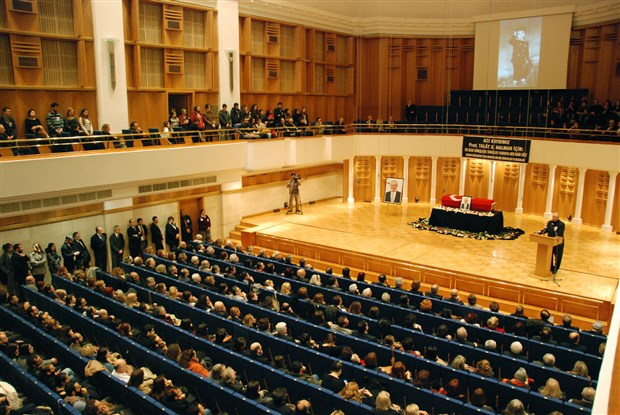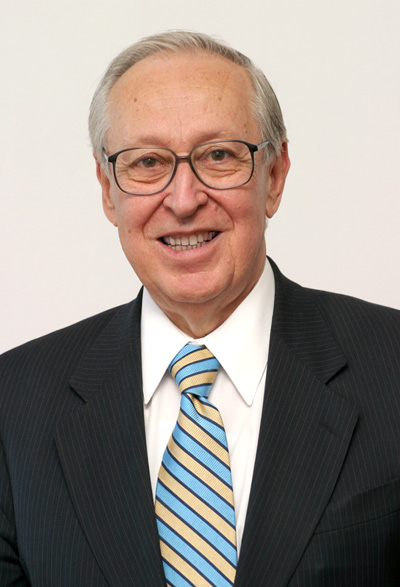Professor Talât Halman, dean of the Faculty of Humanities and Letters, founding chairman of the Department of Turkish Literature and Turkey’s first Minister of Culture, passed away on December 5, 2014, following a massive heart attack. We extend our condolences to his family, colleagues, students and the Bilkent community.
As news of Prof. Halman’s death became known, tributes began to pour in from those who had known him or been touched by his work in one of the many areas of his multifaceted career: as a scholar, a teacher, a littérateur, a cultural envoy. His passing evoked great sadness as well as many fond memories among not only those with connections to Bilkent, but also individuals throughout Turkey and around the globe.
A ceremony to commemorate Prof. Halman was held on Monday, December 8, at the Bilkent Concert Hall, following a ceremony in the Grand National Assembly on the same day. Those who addressed the large gathering included Prof. Ali Doğramacı, chairman of the Board of Trustees and president of the University; Dr. Devrim Dirlikyapan, former student; Assoc. Prof. Nuran Tezcan of the Department of Turkish Literature; Dr. Seda Uyanık, former student; Lieke Van de Wiel, UNICEF Turkey representative; Prof. Semih Tezcan of the Department of Turkish Literature; and Defne Halman, Prof. Halman’s daughter.
The funeral services will be held at Teşvikiye Mosque in İstanbul following the noon prayers, and the burial will take place at Edirnekapı Cemetery on Tuesday, December 9.
All those who wish are invited to offer their condolences at http://taziye.bilkent.edu.tr/TalatHalman/.
Talât Sait Halman was born in İstanbul on July 7, 1931. He received a BA from Robert College (now Boğaziçi University) in İstanbul, and a master’s degree from Columbia University. His long teaching career included appointments at Columbia, Princeton University, the University of Pennsylvania and New York University, where he was chairman of the Department of Near Eastern Languages and Literatures.
In 1998, Prof. Halman spearheaded the establishment of the program in Turkish languages and literature at Bilkent University, serving as chairman of the Department of Turkish Literature up until the time of his death. He was also editor-in-chief of the Journal of Turkish Literature, published by the Center for Turkish Literature at Bilkent.
During the 1970s and 1980s, Prof. Halman served not only as Turkey’s first minister of culture, but also its first ambassador for cultural affairs and, in addition, the country’s deputy permanent representative at the United Nations. From 1991 to 1995, he was an elected member of the UNESCO Executive Board. He served as president of the Turkish National Committee for UNICEF for many years.
Alongside his busy career in academia, government and international affairs, Prof. Halman found time to write. He was a prolific author, translator and critic, and a poet as well as a scholar. His publications included more than 60 books (including 12 collections of his own poetry in Turkish and English) and 3,000 articles in Turkish and English. His 1984 book on Celalettin Rumi preceded and contributed to the wave of Rumi enthusiasm in the United States in the 1990s. His books on Rumi, Nasrettin Hoca and Turkish legends are widely available throughout Turkey; his translations from English into Turkish include works that vary from Shakespeare’s complete sonnets to plays by Eugene O’Neill and Robinson Jeffers.
Honors and awards received by Prof. Halman include Columbia University’s Thornton Wilder Prize (for lifetime achievement as a translator), three honorary doctorates, distinguished service awards from the Turkish Academy of Sciences and the Turkish Foreign Ministry, and the UNESCO Medal. He was also made a Knight Grand Cross of the British Empire (GBE).
 This highly impressive (although very abbreviated) list of Prof. Halman’s accomplishments is, however, inadequate to convey a true sense of the man. Those who had the privilege and pleasure of knowing him, or even of only hearing him speak or read poetry, were struck by the natural ease and fluidity with which he moved between languages, as well as the genuine graciousness, urbanity and charm of his demeanor. “A man of diverse talents and accomplishments”; “a truly global individual”; “a Renaissance man of our time” are some of the phrases that have been used to describe Talât Halman. His presence at Bilkent will be greatly missed by colleagues, students and the entire university community.
This highly impressive (although very abbreviated) list of Prof. Halman’s accomplishments is, however, inadequate to convey a true sense of the man. Those who had the privilege and pleasure of knowing him, or even of only hearing him speak or read poetry, were struck by the natural ease and fluidity with which he moved between languages, as well as the genuine graciousness, urbanity and charm of his demeanor. “A man of diverse talents and accomplishments”; “a truly global individual”; “a Renaissance man of our time” are some of the phrases that have been used to describe Talât Halman. His presence at Bilkent will be greatly missed by colleagues, students and the entire university community.
For this man of letters, it is only right that the last words be his own: the title poem from a collection of his verse, “A Last Lullaby.”
The only morbid thing my mother did
was to let an orange rot on the porch.
I doubt if it was a symbol for her:
she did not see the mold as cruel fate,
the flies as hubris, the smell as despair.
She would gaze at it and whisper to it
the way she had once sung her lullabies.
“Maybe,” said my brother,” she hopes to turn
it into a fruit of Paradise.” No—
all she wanted was to stare and murmur:
and the orange just stared back and murmured.
They lulled each other to one last remorse.

